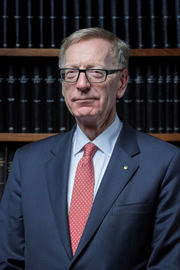Back in 1998, the day Justice Hayne declared that Australia was still a Colony, he eliminated three thousand treaties and our membership of the UN and the International Labour Organisation.
See Court Transcript:
An extraordinary decision in the High Court of Australia in Melbourne on 15 December 1998 led to the application for an International Criminal Tribunal. That day Justice Hayne declared that Australia had domestic sovereignty but did not have international sovereignty, in other words we were still a colony. However for the future of Australia the die was cast when Justice Hayne also declared in delivering his judgement that it was his task "to protect the system". There was no mention of justice, or truth, or historical fact, just legal opinion and "the system".
The "system" is the continued use of British law and authority in Australia
Just 6 months later on 23 June 1999 the Full Bench of the High Court of Australia ruled that the United Kingdom was a "foreign power" for the purposes of Section 44 of the Commonwealth Constitution when the Constitution is the legislation of the Parliament of the United Kingdom alone. In other words the High Court ruled that the United Kingdom is a foreign power under its own legislation.
Little wonder that many observers think the main legal reference for the Australian courts is "Alice in Wonderland".
To anyone outside Australia the current system is unbelievable in a modern society. At the time of white settlement consisting of convicts and their military guards, the few bureaucrats were the colony’s rulers. They were not "public servants" in the ordinary meaning of the words but "public masters". The attitudes created then among Australian bureaucracy persist even today.
In the words of eminent British authorities the sovereignty of the United Kingdom belongs jointly to the Crown, the House of Lords and the body of voters who elect the House of Commons. At the time of white settlement this body held legal sovereignty over Australia. But at the end of the 20th Century the British people no longer have any right to sovereignty over Australia. At whatever time Australia became a nation it ceased to owe allegiance or obedience to the British people through their parliament or crown. This could not have been later than 1945 when Australia presented itself as a nation to join the UN.
This break in legal continuity, which actually occurred in 1919 when sovereignty was transferred from the British people and parliament to the Australian people, has never been accepted or recognised by the legal profession or the governments. As a result the Australian bureaucracy has never become the civil servants of the sovereign Australian people and has remained an arm of the British government.
Australia is the only OECD country which does not have a Bill of Rights in any form. On the basis that Australian civil rights are protected by common law Australian governments and their courts refuse to recognise in enforceable law fundamental human rights statements, such as the Universal Declaration of Human Rights 1947, and its successors the Convention on the Rights of the Child and the Covenant on Civil and Political Rights, all supposedly agreed to by Australia under international treaties.
Yet the same common law courts which don’t recognise the break from British legal authority refuse to recognise and enforce the rights and freedoms which existed under British sovereignty. On 25 February 2000 the Full Bench of the Federal Court sitting in Brisbane ruled that the peoples’ rights under Magna Carta, the 1688 Bill of Rights and the Petition of Right had no validity in Australia and could not be enforced in the courts. Australia’s inherited "British" system would be unrecognisable in Britain.
This extraordinary document was never intended to exist. No nation has ever filed such an Application with the United Nations and if the Australian Courts had acted honestly this document would not have been the first.
When the facts and official documents which form the bulk of this publication began to emerge, all the participants believed that when the legal problems were found to originate 80 years ago our current generation of lawyers and judges would examine the facts and begin the process of rectification through delivery of honest judgements.
We were wrong, not about the facts of history which show the rest of the world recognised Australian sovereignty back in 1919, but we were wrong about the honesty of current Australian lawyers, legal academics and judges. With few exceptions their only instinct has been to defend the status quo, their privileges and their income.
Luckily lawyers and legal academics in the rest of the world instantly saw the absurdity of a nation still governed as a colony. The authors of the application wish to publicly acknowledge the generous assistance of the faculties and staff of the 14 major universities who provided research assistance and copies of major public documents at a time when comparable Australian sources were concealing and denying the existence of the same documents.
